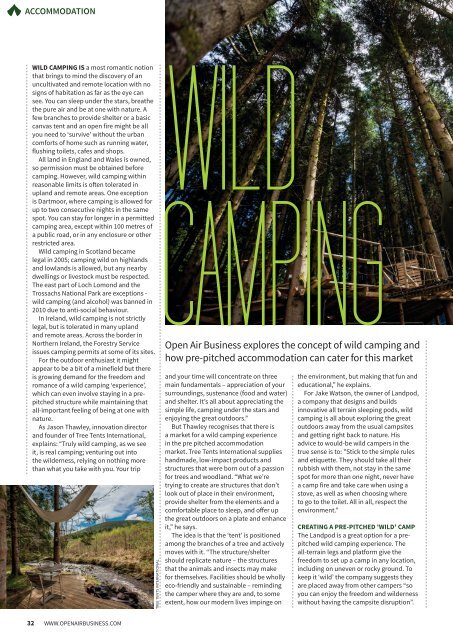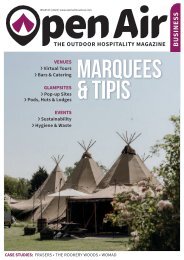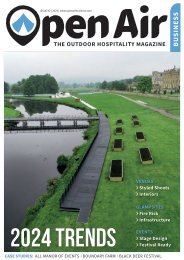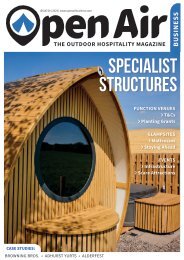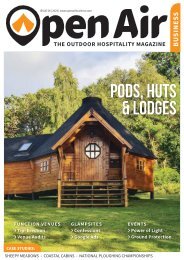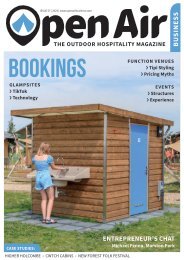Open Air Business February 2017
The UK's outdoor hospitality business magazine for function venues, glamping businesses and outdoor event organisers
The UK's outdoor hospitality business magazine for function venues, glamping businesses and outdoor event organisers
Create successful ePaper yourself
Turn your PDF publications into a flip-book with our unique Google optimized e-Paper software.
ACCOMMODATION<br />
WILD CAMPING IS a most romantic notion<br />
that brings to mind the discovery of an<br />
uncultivated and remote location with no<br />
signs of habitation as far as the eye can<br />
see. You can sleep under the stars, breathe<br />
the pure air and be at one with nature. A<br />
few branches to provide shelter or a basic<br />
canvas tent and an open fire might be all<br />
you need to ‘survive’ without the urban<br />
comforts of home such as running water,<br />
flushing toilets, cafes and shops.<br />
All land in England and Wales is owned,<br />
so permission must be obtained before<br />
camping. However, wild camping within<br />
reasonable limits is often tolerated in<br />
upland and remote areas. One exception<br />
is Dartmoor, where camping is allowed for<br />
up to two consecutive nights in the same<br />
spot. You can stay for longer in a permitted<br />
camping area, except within 100 metres of<br />
a public road, or in any enclosure or other<br />
restricted area.<br />
Wild camping in Scotland became<br />
legal in 2005; camping wild on highlands<br />
and lowlands is allowed, but any nearby<br />
dwellings or livestock must be respected.<br />
The east part of Loch Lomond and the<br />
Trossachs National Park are exceptions -<br />
wild camping (and alcohol) was banned in<br />
2010 due to anti-social behaviour.<br />
In Ireland, wild camping is not strictly<br />
legal, but is tolerated in many upland<br />
and remote areas. Across the border in<br />
Northern Ireland, the Forestry Service<br />
issues camping permits at some of its sites.<br />
For the outdoor enthusiast it might<br />
appear to be a bit of a minefield but there<br />
is growing demand for the freedom and<br />
romance of a wild camping ‘experience’,<br />
which can even involve staying in a prepitched<br />
structure while maintaining that<br />
all-important feeling of being at one with<br />
nature.<br />
As Jason Thawley, innovation director<br />
and founder of Tree Tents International,<br />
explains: “Truly wild camping, as we see<br />
it, is real camping; venturing out into<br />
the wilderness, relying on nothing more<br />
than what you take with you. Your trip<br />
WILD<br />
CAMPING<br />
<strong>Open</strong> <strong>Air</strong> <strong>Business</strong> explores the concept of wild camping and<br />
how pre-pitched accommodation can cater for this market<br />
TREE TENTS INTERNATIONAL<br />
and your time will concentrate on three<br />
main fundamentals – appreciation of your<br />
surroundings, sustenance (food and water)<br />
and shelter. It’s all about appreciating the<br />
simple life, camping under the stars and<br />
enjoying the great outdoors.”<br />
But Thawley recognises that there is<br />
a market for a wild camping experience<br />
in the pre pitched accommodation<br />
market. Tree Tents International supplies<br />
handmade, low-impact products and<br />
structures that were born out of a passion<br />
for trees and woodland. “What we’re<br />
trying to create are structures that don’t<br />
look out of place in their environment,<br />
provide shelter from the elements and a<br />
comfortable place to sleep, and offer up<br />
the great outdoors on a plate and enhance<br />
it,” he says.<br />
The idea is that the ‘tent’ is positioned<br />
among the branches of a tree and actively<br />
moves with it. “The structure/shelter<br />
should replicate nature – the structures<br />
that the animals and insects may make<br />
for themselves. Facilities should be wholly<br />
eco-friendly and sustainable – reminding<br />
the camper where they are and, to some<br />
extent, how our modern lives impinge on<br />
the environment, but making that fun and<br />
educational,” he explains.<br />
For Jake Watson, the owner of Landpod,<br />
a company that designs and builds<br />
innovative all terrain sleeping pods, wild<br />
camping is all about exploring the great<br />
outdoors away from the usual campsites<br />
and getting right back to nature. His<br />
advice to would-be wild campers in the<br />
true sense is to: "Stick to the simple rules<br />
and etiquette. They should take all their<br />
rubbish with them, not stay in the same<br />
spot for more than one night, never have<br />
a camp fire and take care when using a<br />
stove, as well as when choosing where<br />
to go to the toilet. All in all, respect the<br />
environment.”<br />
CREATING A PRE-PITCHED 'WILD' CAMP<br />
The Landpod is a great option for a prepitched<br />
wild camping experience. The<br />
all-terrain legs and platform give the<br />
freedom to set up a camp in any location,<br />
including on uneven or rocky ground. To<br />
keep it ‘wild’ the company suggests they<br />
are placed away from other campers “so<br />
you can enjoy the freedom and wilderness<br />
without having the campsite disruption”.<br />
32 WWW.OPENAIRBUSINESS.COM


